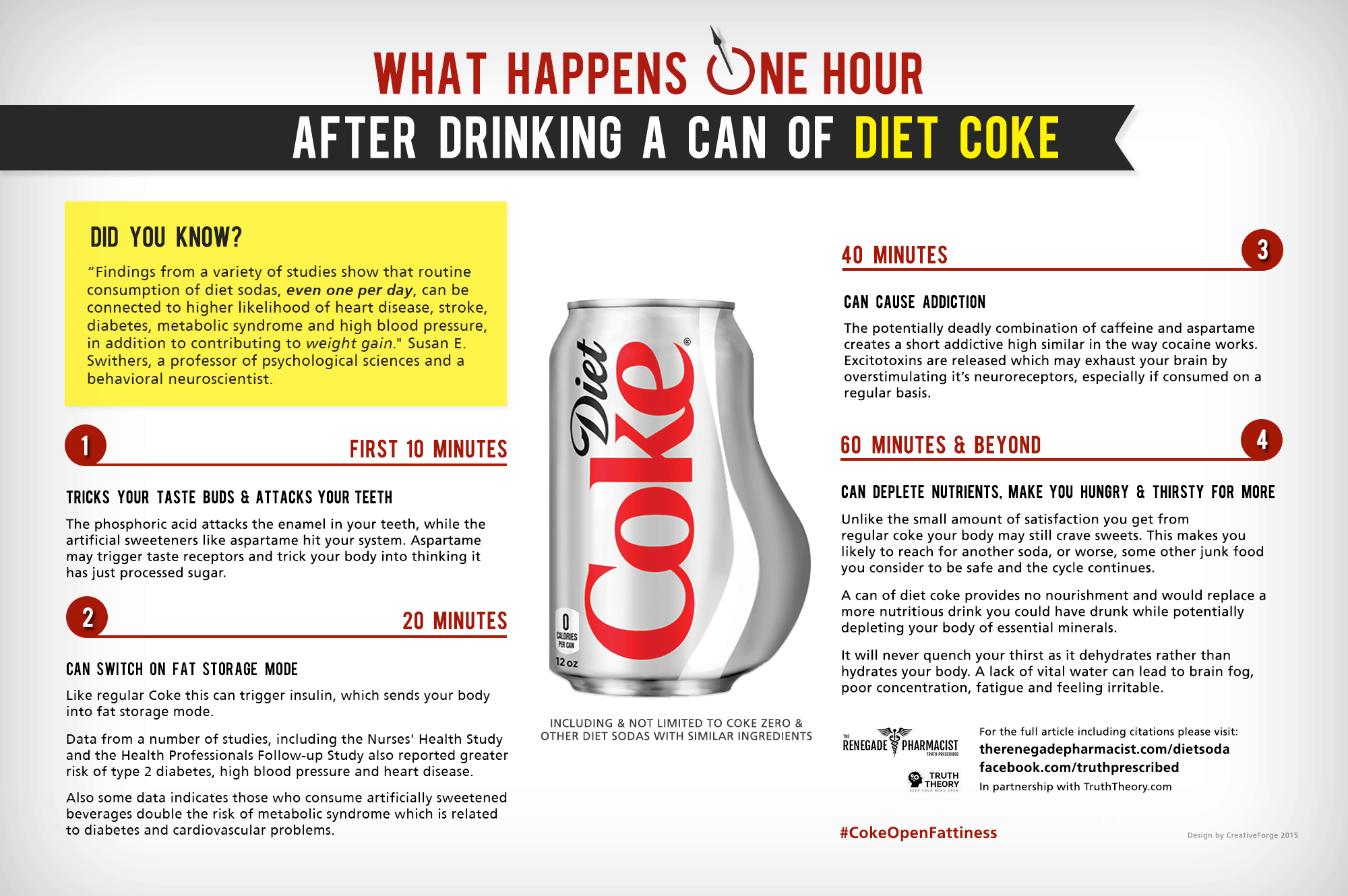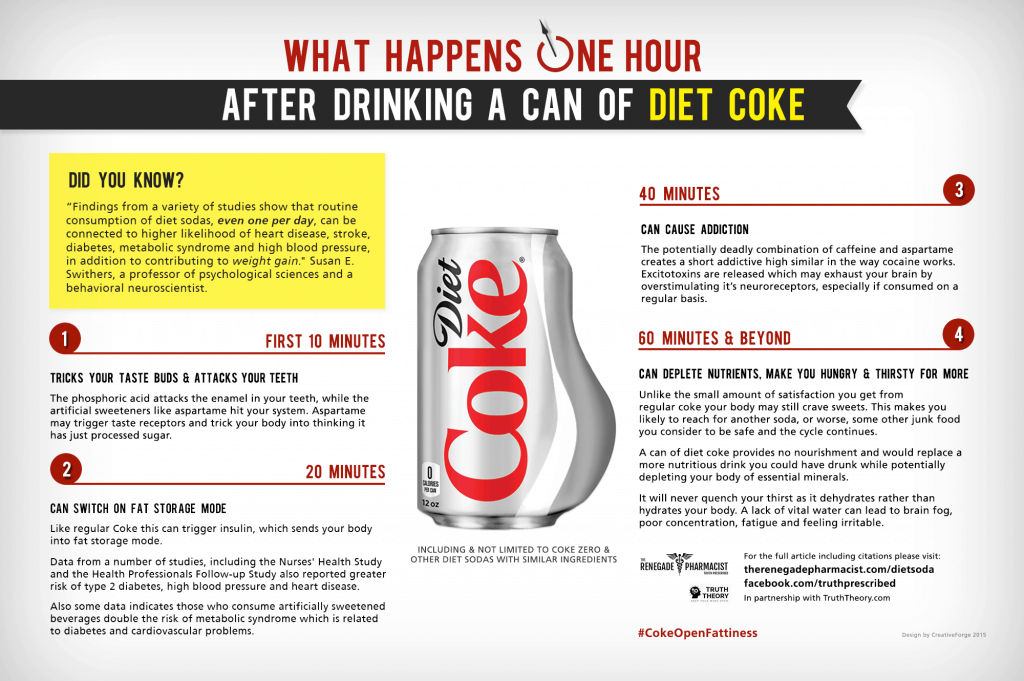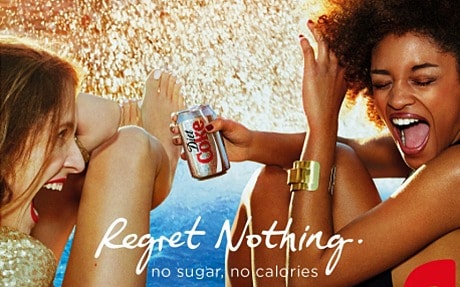Diet Coke Exposed: What Happens One Hour After Drinking Diet Coke, Coke Zero Or Any Other Similar Diet Soda
After the recent incredible popularity of my infographic showing what may happen to you after one hour of drinking a can of regular coke, I have been requested to do a similar one about diet coke from thousands of new supporters and even the media.
Diet Coke was the second best selling soft drink in the US last year but sales have actually dropped since more people have become aware of it’s apparent health risks, according to new figures by trade publication Beverage Digest.
A Coca Cola spokesman gave this statement as their official response to my previous article that made the headlines.
“People have enjoyed drinking a Coca-Cola for more than 129 years. Like all soft drinks, it is perfectly safe to drink and can be enjoyed as part of a balanced diet and lifestyle. We provide a choice of colas to meet the needs of different consumers, including options that are lower sugar, sugar free and caffeine free.”
But is this really true?
The spokesperson did not state how many cans per day is considered safe to drink. They also hint that the lower sugar, sugar free and caffeine free varieties are considered safer.
I’d like to start this article by stating that from my experience as a community pharmacist helping people to get off medications for metabolic diseases such as heart disease, diabetes and obesity, I found if people drink diet sodas they still get the same problems as people who drink normal soda.
The research I found from other well respected scientists back up my claims too and you will discover this in great detail in the new infographic and from this article.
Regret nothing?
I find it hard to believe the coke marketing sleep at night when they created the tagline: “Regret Nothing: no sugar, no calories”
Especially when these facts exist about diet sodas from various scientific sources:
Findings from a variety of studies show that routine consumption of diet sodas, even one per day, can be connected to higher likelihood of heart disease, stroke, diabetes, metabolic syndrome and high blood pressure, in addition to contributing to weight gain.” Susan E. Swithers, a professor of psychological sciences and a behavioural neuroscientist.
Daily consumption of diet soda was associated with a 36% greater relative risk of incident metabolic syndrome and a 67% greater relative risk of incident type 2 diabetes compared with non consumption in the Multi-Ethnic Study of Atherosclerosis (MESA)
http://www.ncbi.nlm.nih.gov/pubmed/19151203
Open Happiness?
Coca Cola actually used cocaine in all their drinks before it was banned. This made the drink infectiously addictive. So in order to maintain its addictiveness they had to create the perfect recipe to do this without cocaine.
The original recipe was actually formulated by a fellow pharmacist Joseph Pemberton, who interestingly was a serious opium addict and also died as one, fatefully leaving behind the legacy of one the world’s most addictive drinks.
The new recipe for diet coke is no different from normal coke in its ability to make you hooked like a drug and with some serious side effects as you will soon discover.
What Happens 1Hr After Drinking Diet Coke, Coke Zero & Any Other Similar Diet Soda
First 10 Minutes – Tricks Your Taste Buds And Attacks Your Teeth
The phosphoric acid attacks the enamel in your teeth, while the artificial sweeteners like aspartame hit your system. Aspartame may trigger taste receptors and trick your body into thinking it has just processed sugar.
The evidence:
Research, including studies from Swithers and colleagues, shows that frequent consumption of high-intensity sweeteners may have the opposite effect by confusing the body’s natural ability to manage calories based on tasting something sweet.
According to a report published in the March / April edition of General Dentistry, phosphoric acid in soda causes tooth enamel erosion, even with minimal exposure.
20 Minutes – May Switch On Fat Storage Mode
Like regular Coke this can trigger insulin, which sends your body into fat storage mode.
The evidence:
Artificial sweeteners, and sugar alcohols (another type of low-calorie sweetener) present in diet colas can all interfere negatively with natural gut bacteria that is part of your immune and digestive system, according to Amanda Payne of Switzerland’s Institute of Food, Nutrition and Health
Data from a number of studies, including the Nurses’ Health Study and the Health Professionals Follow-up Study also reported greater risk of type 2 diabetes, high blood pressure, heart disease and metabolic syndrome, which is related to diabetes and cardiovascular problems, for consumers of artificially sweetened beverages. Some data indicated that those who consumed artificially sweetened beverages had double the risk of metabolic syndrome compared to non-consumers.
40 Minutes – Can Cause Addiction
The potentially deadly combination of caffeine and aspartame creates a short addictive high similar in the way cocaine works. Excitotoxins are released which may exhaust your brain by overstimulating it’s neuroreceptors, especially if consumed on a regular basis.
The evidence:
Excitotoxins are shown to freely penetrate certain brain regions and rapidly destroy neurons by hyperactivating the NMDA subtype of Glu receptor in studies.
Cravings for more coke are explained by the release of two neurotransmitters in the brain, dopamine and glutamate.
Caffeine and aspartame increases dopamine levels as shown in various studies.
Aspartic acid taken in its free form (unbound to proteins), significantly raises the blood plasma level of aspartate and glutamate.
Researchers say glutamate is more essential to addiction than dopamine. Source: Phenotype Offers New Perception on Cocaine The Scientist Date: 21 Jan 2002
http://www.ncbi.nlm.nih.gov/pubmed/7854587
60 Minutes – Depletes Nutrients, Makes You Hungry & Thirsty For More
Unlike the small amount of satisfaction you get from regular coke your body may still crave sweets. This makes you likely to reach for another soda, or worse, some other junk food you consider to be safe and the cycle continues.
A can of diet coke provides no nourishment and would replace a more nutritious drink you could have drunk while potentially depleting your body of essential minerals
It will never quench your thirst as it dehydrates rather than hydrates your body. A lack of vital water can lead to brain fog, poor concentration, fatigue and feeling irritable.
The evidence:
“Some of the connection to metabolic disease could be related to how people behave by saying to themselves, ‘I’m having a diet soda, so this cheeseburger is OK.’ says Swithers
Marisa Peer rated by Men’s Health as Britain’s Best Therapist, a behavioural psychologist and a world renowned expert in eating disorders confirms this, “It is very common to see clients who are overweight who drink diet coke who then eat a plate of chips or reach for the cake. This is because drinking a ‘diet drink’ like diet coke makes them feel it is now ok to eat whatever they want.’
The Big Problem With ‘Zero’ Calories
Marisa has over 20+ years as a weight loss therapist with her method proven to be the only one to work by the famous UK TV series Super Size Super Skinny that tested every method available and claimed only hers to work.
She has this to say about diet sodas and weight gain:
‘Artificial sweeteners are associated with a drop in the appetite-regulating hormone leptin. Leptin is the hormone that inhibits hunger so diet drinks like diet coke actually make you hungry and less satisfied with normal amounts of food, and finally when you eat or drink a lot of chemicals that your body simply cannot break down, your body makes more and more internal fat to wrap the chemicals in keeping those harmful chemicals away from your vital organs. As diet coke has no calories and no recognised ingredients we know it is a cocktail of chemicals that encourage your body to gain and store weight especially on your legs and bottom away from your organs. diet drinks are not good for your body your health or even as it turns out for dieting.’

Joan Collins the famous British actress famed for her ageless beauty, once said that she doesn’t drink diet soda “because you never see skinny people drinking it!”
More Hidden Dangers
A can of diet cola contains 44-62mg of phosphoric acid, more than in many other soft drinks and researchers at Tufts University in Boston showed that women who regularly drank three or more cans a day had four per cent lower bone mineral density in their hips compared to those who preferred other soft drinks.
Phosphoric acid has also been linked to lower bone density in some studies, including a discussion in the American Journal of Clinical Nutrition.
In experiments at Harvard University, it was found to make skin and muscles wither and to damage the heart and kidneys over time.
Phosphoric acid has been associated with urinary changes that promote kidney stones and drinking 2 or more colas per day is associated with increased risk of chronic kidney disease caused by a combination of phosphoric acid, caffeine and other additives.
http://www.ncbi.nlm.nih.gov/pubmed/17525693
Chronic consumption of aspartame can lead to potentially harmful side effects to your body, and the long term effects in humans are still not certain, although recent studies in animals prove its damaging effects, especially to the brain.
Various studies have shown:
About fifty per cent of aspartame is made up by phenylalanine, which could cross the blood-brain barrier and act as a precursor of catecholamine in the brain, as well as leading to phenylketonuria.
Forty per cent of aspartame is composed of aspartic acid, an excitotoxin that contributes to free radical damage in the brain.
Methanol which forms 10% of the by-products of aspartame is a toxic compound converted in the liver to formaldehyde that is neurotoxic and carcinogenic.
Luke Miller from Truth Theory has a little bit of a different spin on this and share the ingredients which are inside your diet coke can. It’s not pretty! You can read more about that here
Would all diet sodas have the same effect? Pepsi for instance? Or is this information relevant to just diet coke?
Yes all diet beverages with similar ingredients to Diet Coke will have the same or similar effects.
In your opinion, are diet drinks (beverages which contain aspartame) more harmful than sugar laden drinks/food?
Yes they are found in several studies to be actually worse:
According to Mark Hyman MD , a practicing family physician, an nine-time #1 New York Times bestselling author who has a special interest in sugar and its health risks:
A study published in the American Journal of Clinical Nutrition discovered some alarming facts:
1. Diet fizzy drinks increased the risk of diabetes more than regular fizzy drinks sweetened with sugar.
2. Women who drank one 12oz diet fizzy drink had a 33% increased risk of type 2 diabetes and women who drank one 20oz soda had a 66% increase in risk.
3. Women who drank diet fizzy drinks drank twice as much as those who drank regular fizzy drinks sweetened with sugar, because artificial sweeteners can be more addictive and are up to a 1000 times sweeter than regular sugar.
4. The average diet fizzy drink consumer drinks 3 diet drinks a day.
In this study they scientifically controlled for body weight and they found that the artificial sweeteners still increased diabetes independent of body weight!
The Correlation vs Causation Debate
There is endless debate about the validity of claims made based on correlation and whether correlation really means causation.
The truth is that the only way to really prove causation (i.e A specifically causes B to happen, rather than if you increase A it has been shown that B increases) is through a double blind randomised placebo controlled trial.
The issue is that in order to do something like this it would cost a lot of money and it is out of reach of most people except for major corporations or extremely wealthy private individuals.
You also have an ethical issue whether you want to subject people in trials to substances that have an overwhelming amount of evidence in the form of correlation that they could do harm.
This video really explains it well:
With regards to diet sodas there is evidence on both sides based on correlation that can prove they are harmless, and can also prove it is toxic and should be avoided completely.
I know that for myself I feel amazing, rather than ‘ok’ or ‘fine’ health wise. I am into peak performance and diet soda’s definitely do not provide the foundations for that.
The Choice Is Yours…
Do you really want to be a guinea pig on trial just so you can still enjoy your favorite drink, or do you think it makes sense to find more natural and safer alternatives, and see diet soda as a treat to be had once in a while?
Do you really want to be hooked on a drink like diet coke anyway given all the apparent risks from a variety of sources and anecdotal evidence from many experts?
Please do your own research, do not take my word as gospel. Look at all the evidence out there, so you can make a well informed decision.
Here are some of my recommendations for far healthier alternatives:
- Look for stevia (a natural sweetener) versions of soft drinks if you really must drink a soft drink.
- Drink plain mineral water with fresh lime or lemon juice or both with a dash of organic honey, if you prefer a sweeter taste, as a very healthy and hydrating drink.
- Drink green tea if you want the effects of caffeine without the jitters. L-theanine in green tea is the antidote to caffeine’s negative effects on the nervous system and it also boosts ‘alpha waves in your brain’
- Drink Kombucha or Kefir tea. They are both naturally fizzy and Kefir tea in particular can provide a dose of probiotics for promoting better digestion and health of your gut.
- Learn to make or buy nutritious smoothies made out of green vegetables like spinach, low sugar fruits like blueberries and tasty ingredients like coconut butter that are full of essential nutrients and health promoting fatty acids.
Bottom line: Moderation is key. Even just one can a day can put you at higher risk of metabolic diseases like heart disease, diabetes and obesity.
View any heavily processed drinks like diet sodas as a treat to be consumed once in a while and you should be ok.
To your health,
The Renegade Pharmacist
If you want a simple way to destress and get to your peak performance level, I invite you to join me in a live SOMA Breathwork Meditation every sunday guided by me (free of charge)
Citations:
http://www.ncbi.nlm.nih.gov/pubmed/19151203
http://www.cocaine.org/glutamate/addiction.html
http://care.diabetesjournals.org/content/32/4/688.full
http://www.naturalnews.com/021774_phosphoric_acid_soft_drinks.html
Humphries P, Pretorius E, Naude H. Direct and indirect cellular effects of aspartame on the brain.Eur J Clin Nutri. 2008;62(4):451–462.
http://www.ncbi.nlm.nih.gov/pmc/articles/PMC3824455/#R7
http://www.ncbi.nlm.nih.gov/pubmed/17525693
Source: Phenotype Offers New Perception on Cocaine The Scientist Date: 21 Jan 2002
http://www.ncbi.nlm.nih.gov/pubmed/7854587
http://www.telegraph.co.uk/women/womens-life/11417728/Diet-Coke-has-created-a-new-woman-type-the-Impulsista.-Shoot-me.html
http://www.ncbi.nlm.nih.gov/pubmed/19151203
http://www.ncbi.nlm.nih.gov/pubmed/7854587
http://www.ncbi.nlm.nih.gov/pubmed/17525693







Very informative. I rarely drink soda. Thanks.
This is great. I have been telling my partner this for years, but to see the actual affect is amazing.
I’d really like to see a similar one done for coffee now!
Great infographic! Thanks for sharing! I hope the message gets through to the thousands (millions) who are addicted to Coke and similar products.
Shame about the typo in paragraph 4 (it’s instead of its)…
Please I need help to come off it. I have had 8 separate fractures over 7yrs and been told by ortho docs they would sooner I drink beer or full strength coke. I have drank coke/diet for 46yrs. I have cut down but feel I need 1 or 2 a day. I wish I could have a wand placed over me which will stop me taking it.
Desperate
Julia
I noticed all your articles have primarily focused on the Coca-Cola corporation. While some of the articles mention Pepsi or other soft drinks, the photos that get spread around Facebook and social media are all targeting Coke products. I don’t work for Coke, have never worked for Coke and don’t have any family that work for Coke, but I find it odd that there appears to be a definite bias against Coke. But I guess you’re a “pharmacist”, not a journalist.
It was just one example, my title mentions it is related to every similar diet soda. The diet coke one was requested by the media.
“Daily consumption of diet soda was associated with a 36% greater relative risk of incident metabolic syndrome and a 67% greater relative risk of incident type 2 diabetes compared with non consumption in the Multi-Ethnic Study of Atherosclerosis (MESA)”
That’s clearly a correlation, not a causation. And what common cause could there be for drinking diet soda and having a higher risk of type 2 diabetes? I would guess being obese (from other diet and lifestyle causes than diet soda) would be a leading cause of both of those things.
Please read this from the article:
According to Mark Hyman MD , a practicing family physician, an nine-time #1 New York Times bestselling author who has a special interest in sugar and its health risks:
A study published in the American Journal of Clinical Nutrition discovered some alarming facts:
1. Diet fizzy drinks increased the risk of diabetes more than regular fizzy drinks sweetened with sugar.
2. Women who drank one 12oz diet fizzy drink had a 33% increased risk of type 2 diabetes and women who drank one 20oz soda had a 66% increase in risk.
3. Women who drank diet fizzy drinks drank twice as much as those who drank regular fizzy drinks sweetened with sugar, because artificial sweeteners can be more addictive and are up to a 1000 times sweeter than regular sugar.
4. The average diet fizzy drink consumer drinks 3 diet drinks a day.
In this study they scientifically controlled for body weight and they found that the artificial sweeteners still increased diabetes independent of body weight!
I like the fact that this article provided links/references to support its conclusions, but in this case simply saying a scientifically controlled study exists to support your position does not support your position.
Please provide a link to this study or cite this reference so others can verify it.
I have already added many references inside the article. Please tell me which one in particular you would like a citation for?
I was looking for the study published in the American Journal of Clinical Nutrition that Mark Hyman MD referred to. Never mind looking it up, I found the link on his website. Here it is http://ajcn.nutrition.org/content/early/2013/01/30/ajcn.112.050997
The study concluded:
“Both sugar-sweetened beverages (SSB) consumption and artificially sweetened beverages (ASB) consumption were associated with increased T2D risk. We cannot rule out that factors other than ASB consumption that we did not control for are responsible for the association with diabetes, and randomized trials are required to prove a causal link between ASB consumption and T2D.”
The authors of the study clearly state that the study did not prove that artificial sweeteners increased diabetes, yet Dr. Hyman strongly infers the study supports that conclusion.
In my opinion, either Dr. Hyman misunderstood the finding of the study or he knowingly misrepresented them to support his own agenda.
Dr Monte, in a few pages of his book, and by email, has indicated that the Pancreas has, at the islets-of-langerhanss, a large number of ADH-I that can metabolize methanol (but only if the ADH-I is not occupied by ethanol, the larger 2 carbon alcohol that the ADH-I has an affinity to metabolize, more so than methanol) … So, ANY methanol at the ADH-I, but only if the ADH-I is not metabolizing Ethanol, becomes – the Methanol from diet soda and other sources, is metabolized into formaldehyde/formaldehyde
hydrate, that will then very very quickly methylate with the close by Amino Acids (formaldehyde loves Arginine, and Arginine loves formaldehyde) and Proteins (including beta cells that produce insulin) AND then, the immune system responds! Annd you have diabetes. A slow over time process that clearly depends on ADH-I gentics and how fast or slow, or how many there are, available to metabolize ethanol, then if available like musical chairs, the methanol. Methanol and Formaldehyde are the problem. WHY, otherwise, would the immune system take so long to destroy the beta cells… as, logically, if the immune system were the enemy of the beta cells, they would attack with such vigor, that in days there would be no beta cells left – where type 2 would never ever would exist, only type I? Please read Dr Monte’s 30 year in the making While Science Sleeps book and his writings for more on this topic, and his references (posted on his web site) have the science to back up his videos and his writings.
http://www.whilesciencesleeps.com/media/
See: “MS – End of Story”
As it is the best video to watch (about MS and Alzheimer’s) but Dr Monte goes into the science in an easy to understand way… that, then you can apply to other Methanol mmetabolized into formaldehyde related issues in the human body (methylated DNA, amino acids, and proteins, …even the case where an LDL is methylated inside walls of blood vessels). Very interesting.
Youtube version of “MS – End of Story”:
https://www.youtube.com/watch?list=PL2E293BD77FA2B8E2&v=4TrXWiwgXJc
http://www.whilesciencesleeps.com/references/
Thanks. All Coke is now banned from this house. (And aspartame too for that matter.)
Aspartame has 92 known side effects, why not take that one on Renegade Pharmacist?
What happens to your body when you drink Alcohol,or Pepsi.I think people need to know about those also!
https://www.youtube.com/watch?v=Mf82FfX-wuU
How would you respond to the arguments and evidence put forward in this video?
*Don’t forget to check the references mentioned in the video. They can be found here: http://theincidentaleconomist.com/wordpress/healthcare-triage-artificial-sweeteners/
A good video (see prior post) with actual “quality” scientific studies/evidence to back up the claims. I checked several of the sources from this diet coke article. Either the evidence presented didn’t quite match the claims, or the evidence was misrepresent to support the claims.
Unfortunately most consumer don’t take the time to fact check the information they’ve been present and I can’t say that I blame them. It is easier to have blind faith in the sales person. It takes hardly any time or effort to let others do the thinking for you.
Thanks for the reply
I am 58 years old. I have been drinking Coke products since I was 11. Recently there have been many articles claiming that most beverages are bad for you. Coffee has acid and other chemicals that could harm you if you drink too much. 100% fruit juice has sugars just like concentrates. Whole milk has too much fat. Even skim milk has fat. Tap water is cautioned against drinking due to pollutants and bacteria. Bottled water may not be bad for you but the bottles may add chemicals that are poisonous. So, in my opinion, pick your poison.
read with intrest your article i smoke but do not drink alcohol but i do drink 3or4 cans of diet or sugar free soda i have found i have not really put on weight but i have a beer belly is this what you mean about the fat side if so if i stop the drinks will it break up and go
Hi Audrey, yes that is exactly the type of fat Marisa Peer refers to in the article. Once you start to limit processed drink and food high in sugar and artificial ingredients in your diet you should start seeing some benefits over time. But to really take your health to the next level you should be doing regular exercise, eating a nutritious balanced diet with quality carbs, healthy fats and proteins.
Could you look into energy drinks like red bull please?
I’ve read this multiple times and I am confused by the overall approach and flow.
1) The author starts by trying to present scientific based arguments against diet coke. The points are well focused, but the conclusions aren’t well supported by the science. At least links to citations were included so readers could fact check the science. Most articles of this nature don’t include links/citations.
2) I applaud taking the time to explain the difference between correlation and causation, but I would and the term anecdotal evidence to the list. They are simple to understand non-scientific concepts that are key to evaluating evidence, yet many people don’t know the difference or use them interchangeably. Maybe these terms should have been defined and used while the evidence was being evaluated.
3) After only presenting evidence against diet coke, the article concludes by basically saying examine all the evidence, and by the way, it’s really okay to drink it, but try to do it in moderation. Based on the tone of the article, I didn’t see this coming.
4) What really confused me was the Useful Resources section. Yes, weight loss, hypnosis, and meditation sites can be useful, but I do not see how this tied in with the overall theme of the article.
Whew! I’m so glad I only drink Diet Pepsi!
Rarely drink soda myself, but the new Coke Life is sweetened with Stevia and Cane sugar….
Hello Niraj! Beautiful infographic, and great information on your entire site. I wondered how I could go about getting permission to reprint this infographic in my upcoming ebook? I’d love to link to your site and include the graphic as a demonstration of the destructive effects of soda.
Many thanks,
Sylvia
Hi Sylvia, yes of course you can! I will email you about it now 🙂
Whilst I agree that any soda can never truly be good for you, this still feels like an attack article containing only negative points about the articles subject. I’d love to see the author do a study on air, i am sure you could show a positive correlation proving people who breathe it… die .
My jaw is starting to clench shut for 30 plus minutes and I get the jitters with the new coke zero.
I drink between 10 and 15 cans of diet coke am I addicted I don’t like water tea fruit so what do I do?
My doctor told me to stop drinking diet sodas, that she’s seeing more and more patients with kidney-related problems, even kidney failure due to drinking diet sodas. Sodas also cause a lot of inflammation in your body and aren’t good for your organs. I now drink water, green tea or Lipton tea with stevia. I can tell a huge difference in my overall health since getting off of diet sodas. I also play the guitar and when drinking a lot of sodas had noticed my hands were swollen & hurting a lot. I wrote it off as too much guitar playing but after stopping the soda drinking drinking more water – my hands feel normal again. Good read “Our Bodies Many Cries For Water”. I didn’t realize how dehydrated I was until I started drinking water. When drinking diet sodas – I woke up a lot at night with my stomach growling & couldn’t go back to sleep until I got up and ate a piece of cheese or something. After switching to water – my stomach instantly stopped growling, no more middle of the night trips to the refrigerator, which is a plus on my figure. Our bodies crave water. The best water is not bottled water but water straight from tap, it has lots of minerals in it & no plastic, it’s also free, which is another plus on my wallet. I’m now in my 50’s & have 2 grandsons, 1 who is a high-functioning autistic, this mimi needs to take care of her health so I can be around for my grandchildren. Grandchildren have a way of making us want to take better care of ourselves.